 |
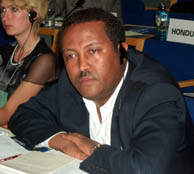  ETHIOPIA expressed dissatisfaction over the text regarding
the process for reviewing CBD Article 14.2 (Impact Assessment
and Minimizing Adverse Impacts), and proposed that, despite budgetary
constraints, COP-5 establish an ad hoc technical expert group
on environmental liability and redress to begin work after COP-6,
a topic that is inevitable, relates to the Biosafety Protocol
and requires in-depth technical scrutiny.
ETHIOPIA expressed dissatisfaction over the text regarding
the process for reviewing CBD Article 14.2 (Impact Assessment
and Minimizing Adverse Impacts), and proposed that, despite budgetary
constraints, COP-5 establish an ad hoc technical expert group
on environmental liability and redress to begin work after COP-6,
a topic that is inevitable, relates to the Biosafety Protocol
and requires in-depth technical scrutiny.
|
 FRANCE offered to organize a workshop during the intersessional
period on liability and redress.
FRANCE offered to organize a workshop during the intersessional
period on liability and redress. |
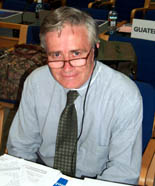 |
|
|
 CANADA, joined by Portugal, on behalf of EU, opposed establishment
of such a working group, adding that it was "premature."
CANADA, joined by Portugal, on behalf of EU, opposed establishment
of such a working group, adding that it was "premature."
 RealAudio of the PORTUGAL / EU statement: PART
ONE PART
TWO
RealAudio of the PORTUGAL / EU statement: PART
ONE PART
TWO
|
 COLOMBIA supported language
proposed by PORTUGAL to include the workshop proposal of France
but not her delegation's concern that the liability is neither premature
nor does it merit to be shifted from one meeting of the Parties
to another.
COLOMBIA supported language
proposed by PORTUGAL to include the workshop proposal of France
but not her delegation's concern that the liability is neither premature
nor does it merit to be shifted from one meeting of the Parties
to another. |
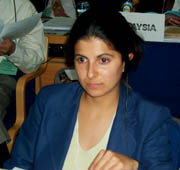 |
|
After informal consultations, delegates
adopted the draft decision with new text welcoming the French government's
offer to organize the workshop and deciding to consider the process
for reviewing Article 14.2 at COP-6, including establishment of
an ad hoc technical expert group, taking into account the issues
under the Cartagena Protocol and the outcome of the workshop.
|
|
|
Interview: The IU & ACCESS
TO GENETIC RESOURCES FOR FOOD AND AGRICULTURE
|
|
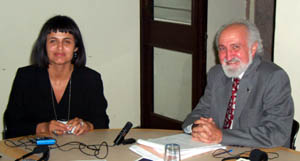 Dr.
José T. Esquinas-Alcazar, Executive Secretary of the FAO Commission
on Plant Genetic Resources for Food and Agriculture, gave an update
on the status of negotiations harmonizing and revising the International
Undertaking (IU) for Plant Genetic Resources for Food and Agriculture
(PGRFA, http://www.fao.org/ag/cgrfa/)
in line with CBD objectives by the end of this year or 2001. He
emphasized the uniqueness of agrobiodiversity, given the values
of raw PGRFA materials and biotechnology. The IU is specifically
concerned with future generations facing unpredictable demands and
environmental changes given the goals of food security, collective
benefit-sharing and the conservation and sustainable use of PGRFA
as already specified in the CBD and FAO Leipzig Plan of Action. Dr.
José T. Esquinas-Alcazar, Executive Secretary of the FAO Commission
on Plant Genetic Resources for Food and Agriculture, gave an update
on the status of negotiations harmonizing and revising the International
Undertaking (IU) for Plant Genetic Resources for Food and Agriculture
(PGRFA, http://www.fao.org/ag/cgrfa/)
in line with CBD objectives by the end of this year or 2001. He
emphasized the uniqueness of agrobiodiversity, given the values
of raw PGRFA materials and biotechnology. The IU is specifically
concerned with future generations facing unpredictable demands and
environmental changes given the goals of food security, collective
benefit-sharing and the conservation and sustainable use of PGRFA
as already specified in the CBD and FAO Leipzig Plan of Action.
Dr. Esquinas-Alcazar further detailed
the incentives behind the IU's multilateral system of facilitated
access to PGRFA, in the case of crops important to food security
and agricultural interdependency. He fleshed out the now adopted
concept of protecting farmer's rights, relating it to the CBD's
somewhat different provisions for benefit-sharing through intellectual
property-rights and bilateral arrangements based on mutually agreed
terms and prior informed consent. He expressed his hope that commercialization,
intellectual property and plant breeding rights will not extinguish
the ideal of multilateralism behind the IU. For him, the IU is a
crucial international venture to conserve PGRFA while enabling equitable
and collective benefit-sharing through the transfer of technology,
capacity building information-exchange and monetary benefits arising
from commercialization of PGRFA.
For related information on the agrobiodiversity
holdings, literature and evolving access procedures of the 16 ex
situ collections within the Consultative Group on International
Agricultural Research (CGIAR) system, contact Jane Toll, Coordinator
of the CGIAR System-wide Genetic Resources Programme [j.toll@cgiar.org]
or browse the recently updated CGIAR
System-wide Information Network for Genetic Resources (SINGER)
|
|
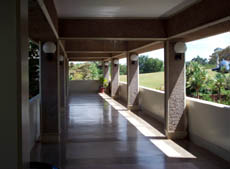 IN
THE BREEZEWAYS IN
THE BREEZEWAYS
As WG-I adjourned early, delegates
wandered into the sunny afternoon, remarking on the relative smoothness
of COP-5 compared to the procedural and organizational hurdles
of COP-4. Some noted that ISOC, two SBSTTA meetings, multiple
liaison and expert group meetings, and pre-concocted decision
drafts were instrumental in facilitating the flow.
Right: at the UN compound
at Gigiri, buildings are not separated
by closed corridors, instead they are linked by open breezeways.
|
|